Jill Jackson’s scrapbook is a visual guide of her experience as a sports and entertainment broadcaster. I specifically looked at the 2nd volume (or second scrapbook) of her collection, which she organized by year. The 2nd volume includes various clippings all transpiring in the 1940’s. Jackson’s scrapbook features newspaper clippings, brochures, invitations, and personal photographs most of which highlighted her achievements as well as what she did while working in the radio business. The second volume had no particular format or subject but did all revolve around her experience while being a broadcaster. Each item memorialized Jackson by displaying her versatile skill in both broadcasting and entertainment radio.
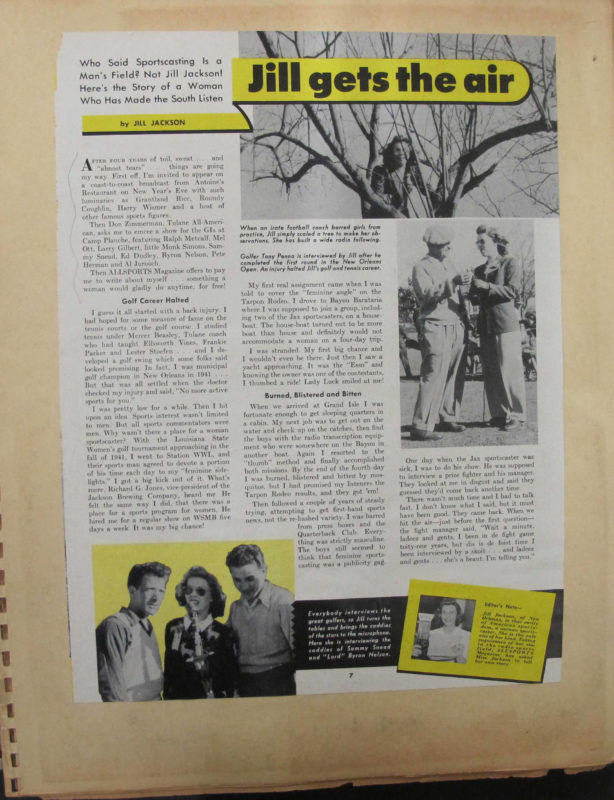
Page 61 of Jill Jackson’s scrapbook. Photo provided by the Newcomb College Scrapbook Collection at Tulane University.
As a tennis and golf champion Jill Jackson was not new to the sports world. Although in the 1940’s the sports broadcasting world was not an easy one to breach, I can imagine that Jill Jackson was rather persistent due to an article she wrote called “Jill Gets the Air.” This article is pasted on page 61 and illustrates how she would end up having to climb trees in order to watch games because the coaches wouldn’t let women get on the field. Being such a dedicated broadcaster it was not surprising that Jackson Brewing Company would later sponsor her sports broadcast on WSMB, five days a week. Jill Jackson, very impressively, wrote her own scripts for the sports programs as well as several others.
In this article Ms. Jackson also projects herself as an unrequited feminist: the first female in a male-dominant industry whom is cognizant of the tribulations she overcame in order to reach a respected status. “Jill Jackson, of New Orleans, is that rarity of American sports-dom, a woman sportscaster. She is the only one of her kind”. Her high sense of self-regard that emanates through this article is substantiated by a collection of media articles throughout her scrapbook, evaluating her worth from the perspective of the community as a whole. One article in particular explains the upward trajectory of her career, explaining how she went from an ill-respected and eager sportscaster to a successful broadcaster with five radio programs. This article is circled in pencil and connected to a newspaper scrap that tells of Jill Jackson’s label as New Orleans most publicized woman.
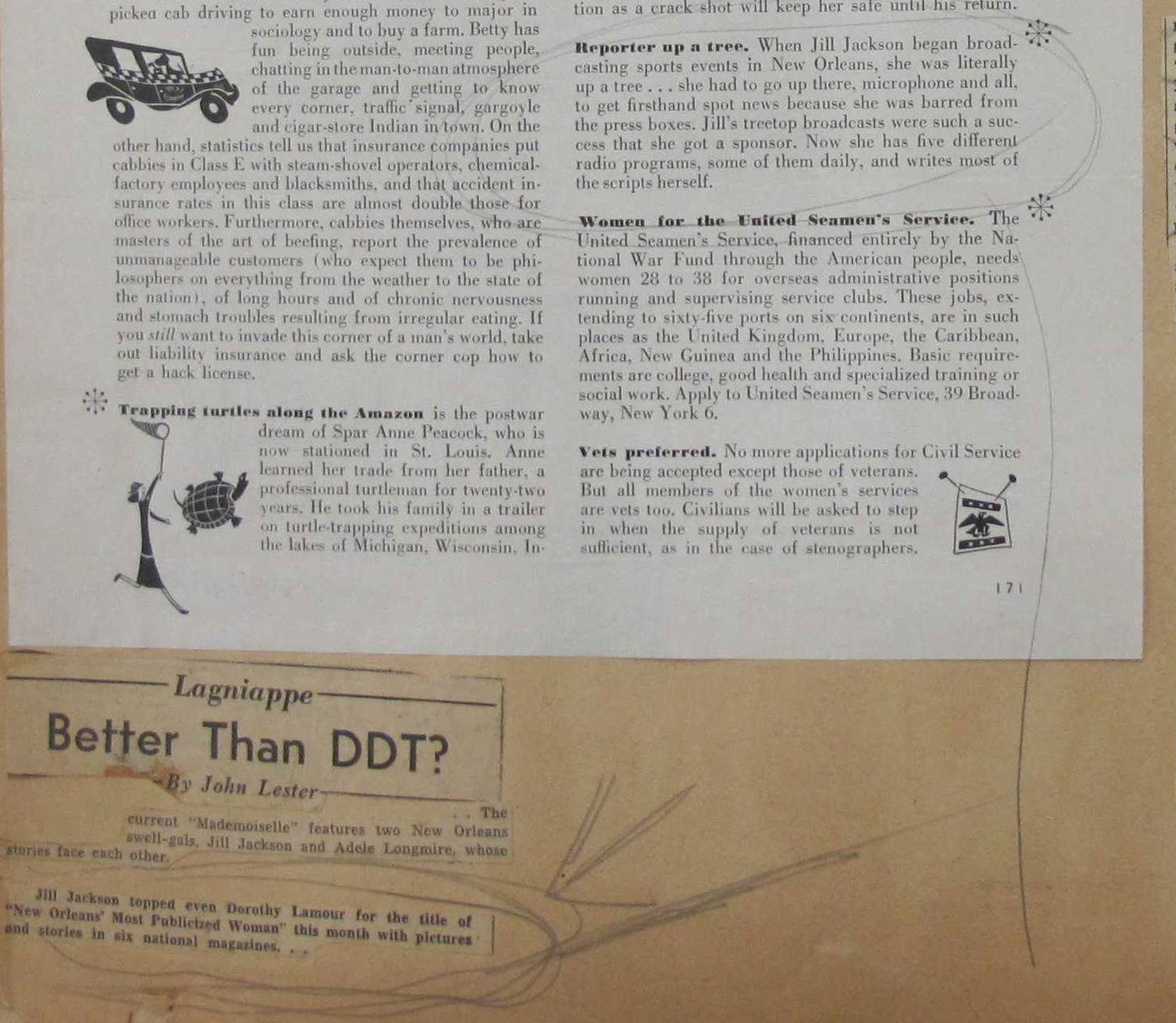
Page 66 features a magazine article’s description of Jill Jackson, and its connection to her new societal status. Photo provided by the Newcomb College Scrapbook Collection at Tulane University.
Through her saved hand-written cards, as well as memorabilia from public interviews, it can be inferred that Jill Jackson had a very successful career. For example, page 32 of her scrapbook contains not only a photograph of Jill Jackson and her subjects, but also a hand-written thank-you note from an individual in the photo, expressing pure enjoyment and gratitude for Jill Jackson’s presentation on her and her husband. Although there are hundreds of articles and photographs – both personal and public – that presumably detail the events that constitute her successful career, I am focusing on the language used in some of these articles, and the aesthetics detailed on relevant the pages, in order to deduce what Jill Jackson’s career meant to her.
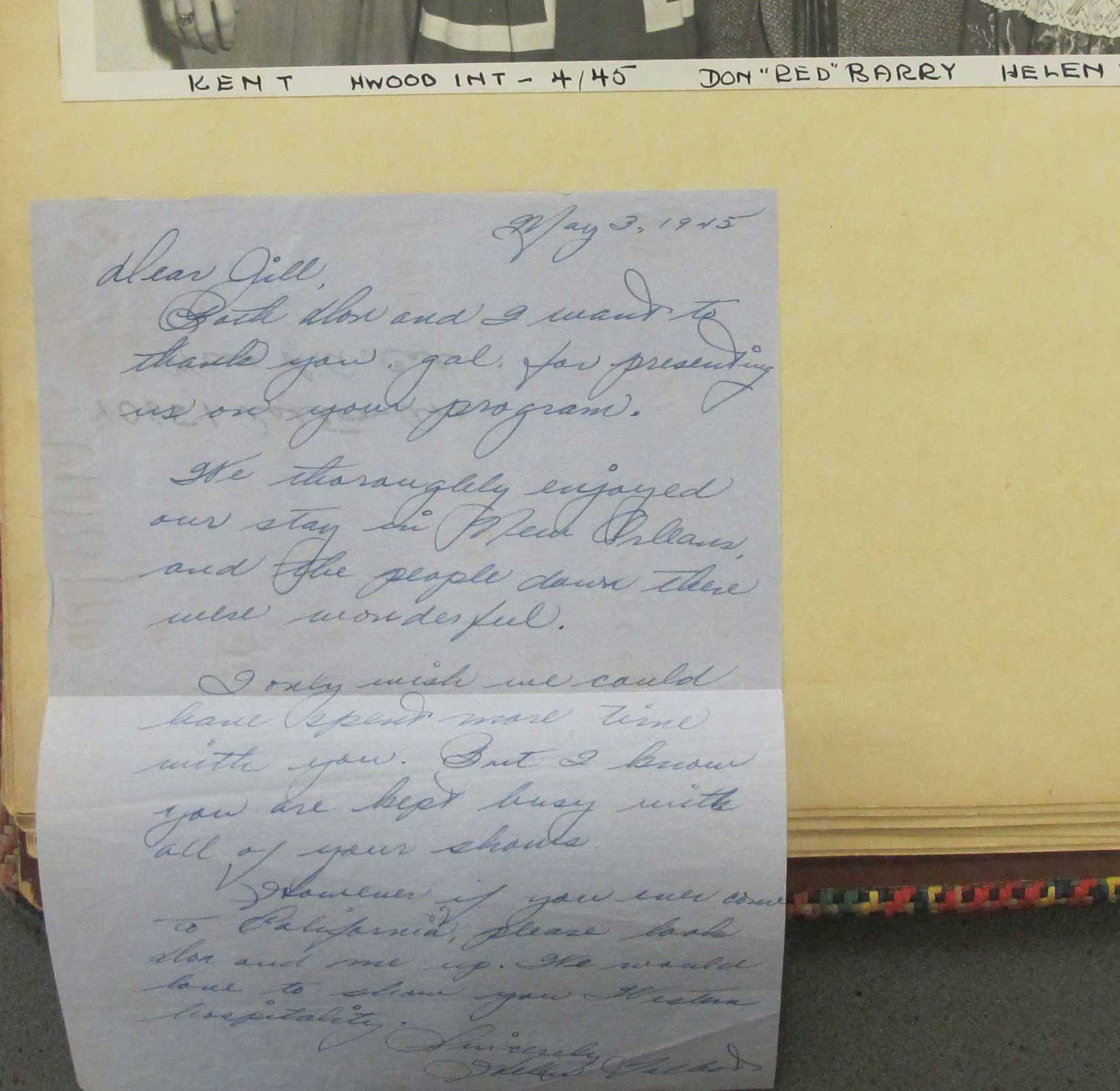
Page 32 shows a thank-you note from Helen and Don. Photo provided by the Newcomb College Scrapbook Collection at Tulane University.
Evidenced through the selection of articles that she presumably cut out of newspapers, Jill Jackson highlights the impact sports have had on her life and projected career. She presents herself as appalled by the previous lack of female athletic presence in the sporting industry, with the intention of making herself appear as a primary proponent in changing this dynamic. In interpreting this as her reason for pursuing a career in reporting and entertainment, Jill Jackson’s scrapbook highlights the personal and selfless success achieved throughout, as well as following, her career.
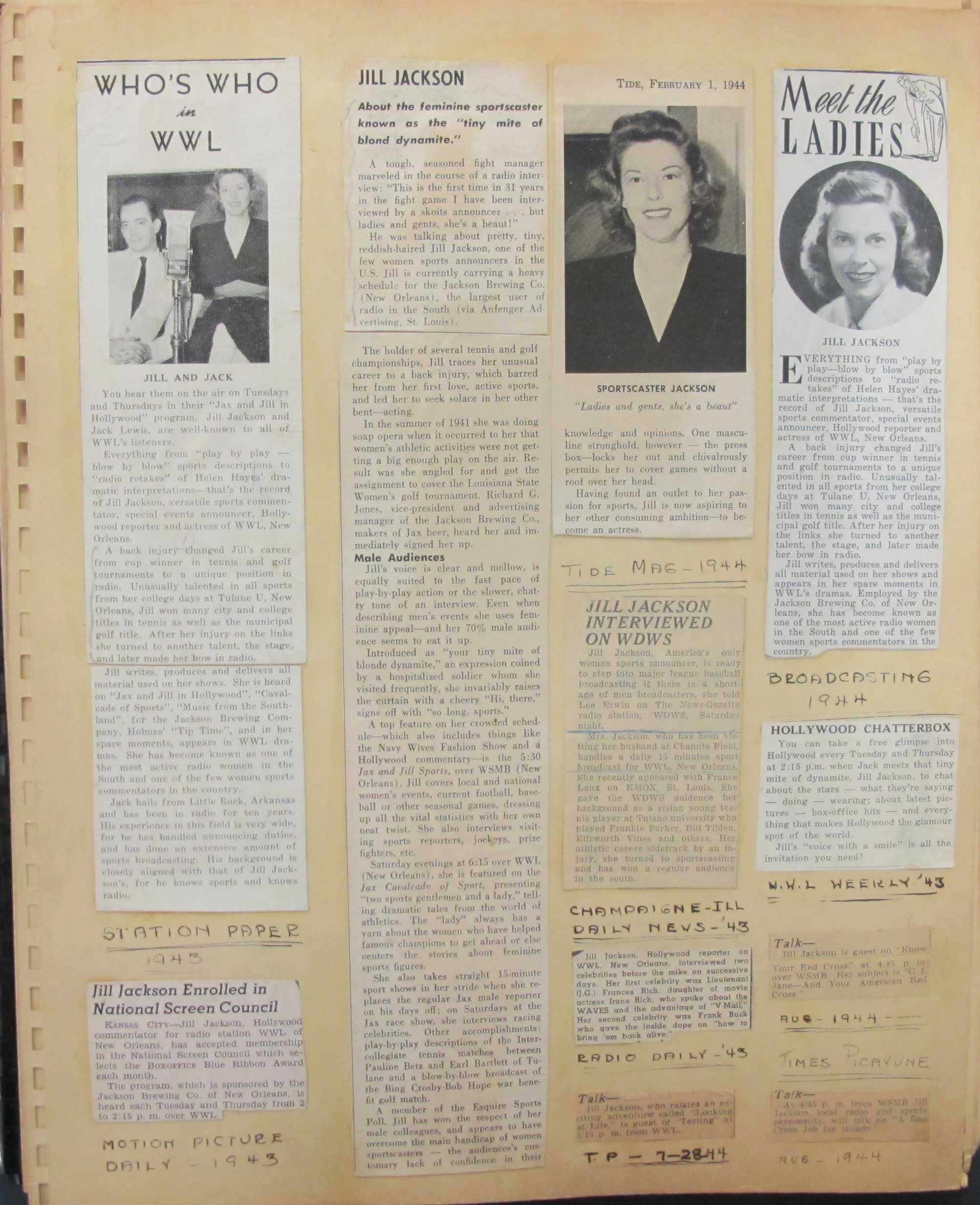
Page 6 articulates Jill Jackson’s opinion on female athletes in the media. Photo provided by the Newcomb College Scrapbook Collection at Tulane University.
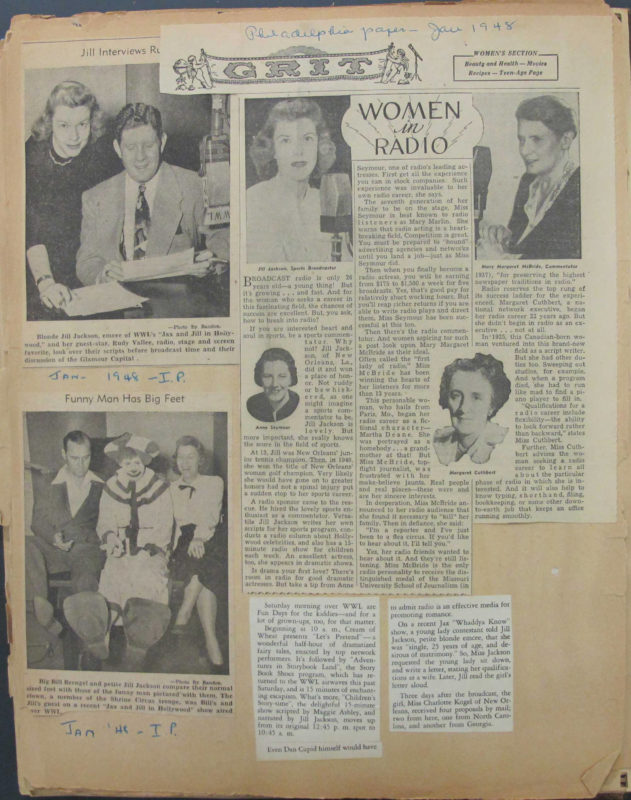
Page 87 of Jill Jackson’s scrapbook. Photo provided by the Newcomb College Scrapbook Collection at Tulane University.
In addition to the sports broadcast, Jill Jackson also put on a “Children’s Hour.” Heard-via WWL and sponsored by D.H. Holmes Co., the show featured children stories being narrated by Jill Jackson, who was deemed the “Lovely Lady With the Lovely Voice.” On page 90 of her scrapbook Jackson placed newspaper clippings and flyers from the radio show that display what kind of stories they told, such as Snow White and Cinderella. I think it is interesting to note that even on the flyers Jill Jackson’s name is not included, but instead the “Lovely Lady With the Lovely Voice.”
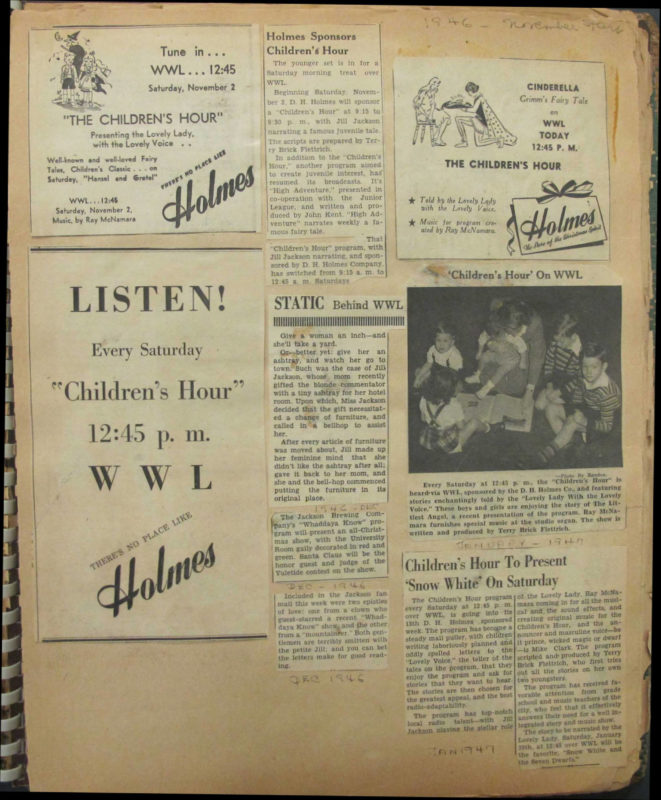
Page 90 of Jill Jackson’s scrapbook. Photo provided by the Newcomb College Scrapbook Collection at Tulane University.
She also helped out charity events and competitions as seen on page 5. The article in this page states, “[Jill and Bill] recently put on a show for the crippled children in the Kenny Unit at Charity Hospital and were directly responsible for contributions to the Mile O’ Dimes Campaign amounting to $275…” I gather that she was a very kind person despite the fame she had accumulated and tried to be a good role model to anyone, especially to young girls looking to be successful in that male dominated society she lived in.
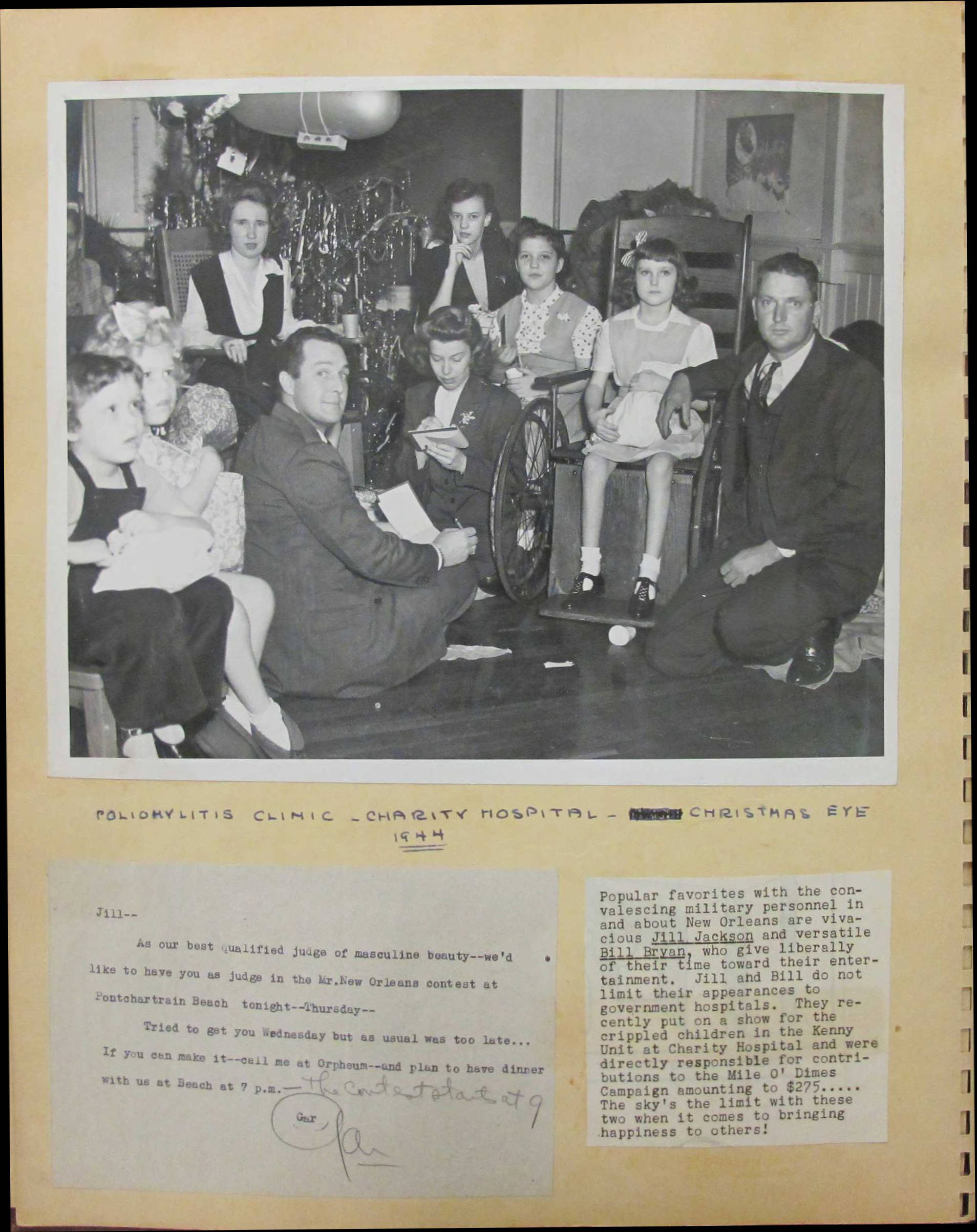
Page 5 of Jill Jackson’s scrapbook. Photo provided by the Newcomb College Scrapbook Collection at Tulane University.
As Jill Jackson expanded her resume she got involved with Hollywood and began a radio gossip column about celebrities. Although there was little on how the articles and the show worked in the scrapbook, there were many photographs of her and stars that were on her show, such as Vivian Blaine and Lawrence Tibbet (pg. 93).
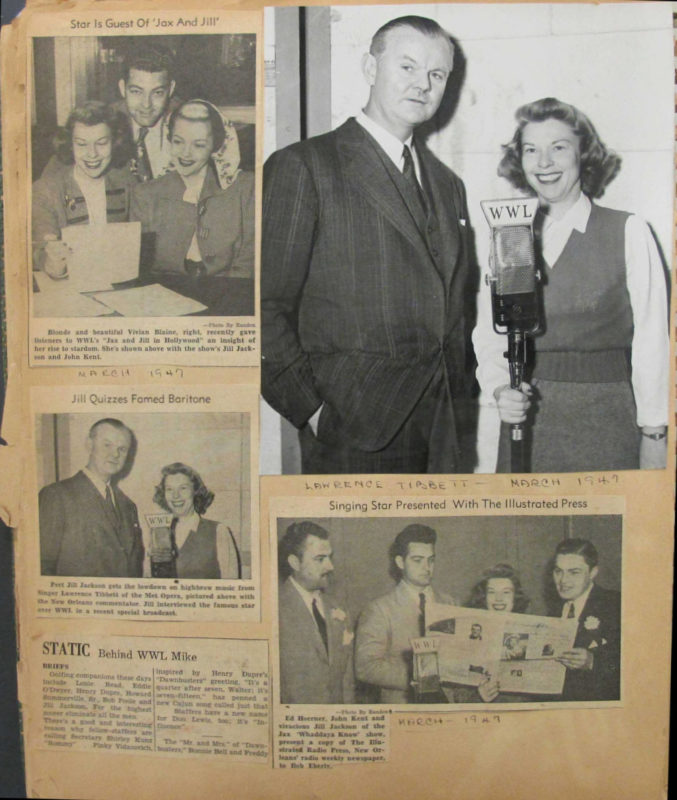
Page 93 of Jill Jackson’s scrapbook. Photo provided by the Newcomb College Scrapbook Collection at Tulane University.
During her time as a broadcaster and entertainer she met many wonderful people it seems, and some of them were quite famous at the time. She met and interviewed quite a few actors and singers, see pages 2, 21, and 31 for some examples.

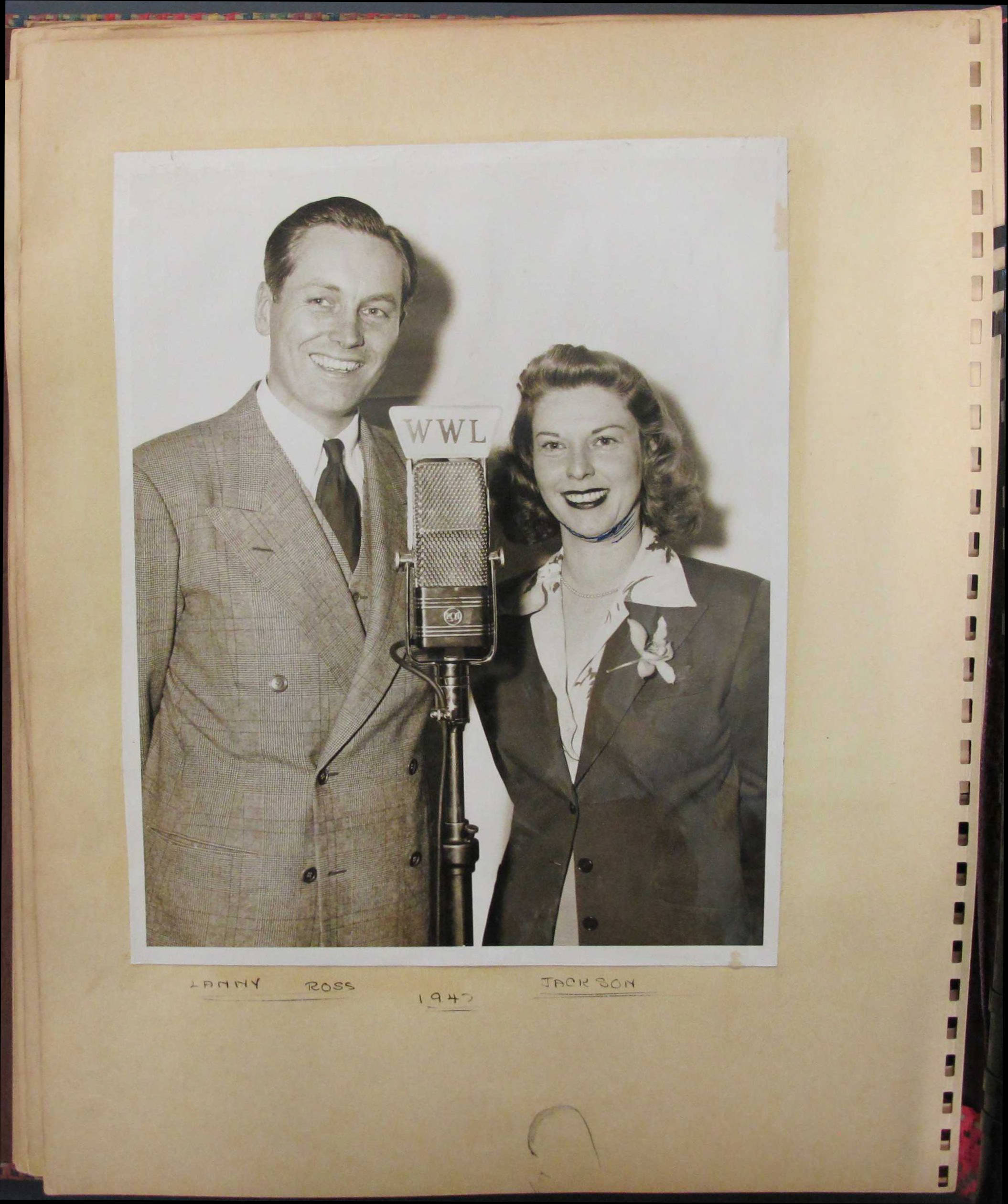
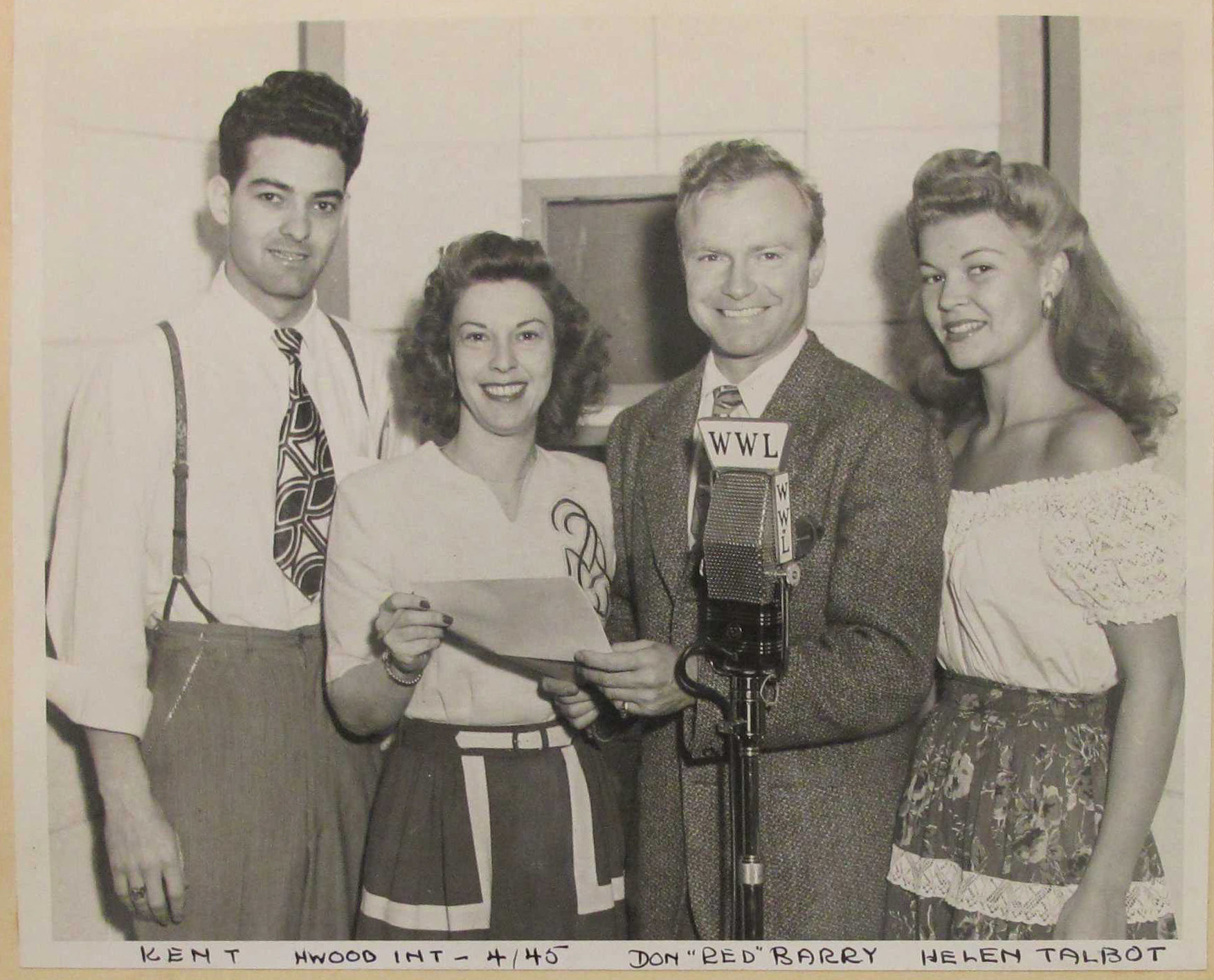
Pages 2, 21, and 31 from Jill Jackson’s Scrapbook. Photos provided by the Newcomb College Scrapbook Collection at Tulane University.
On page 88, several newspapers even document her leaving to go to Hollywood for a summer so that she can interview the stars for the “Jax and Jill in Hollywood” program.
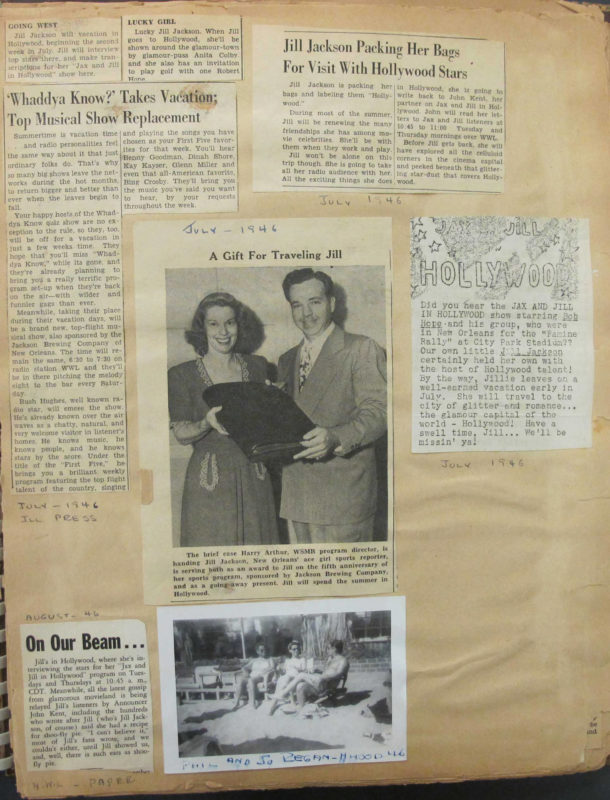
Page 88 of Jill Jackson’s scrapbook. Photo provided by the Newcomb College Scrapbook Collection at Tulane University.
University.
I believe that the temporal trajectory Jill Jackson’s scrapbook follows parallels the path her career takes in order to fulfill her original reason for pursuit. The last quarter of her entire scrapbook collection begins with newspaper articles – not of Jill Jackson herself, but of female golfers in general (page 165, page 166). Evidence pointing to the media’s initial acknowledgement of these female athletes follows the media’s eventual respect for a female in the media industry as a whole: this female being Jill Jackson. Jill Jackson’s status as a respected female in a male-dominant industry is therefore inferred as a personal perk, behaving as a prerequisite that was necessary in order to reach her ultimate goal. From her scrapbook, I deduce that Jill Jackson wanted to be a primary proponent in highlighting female athletes’ visibility in the media.
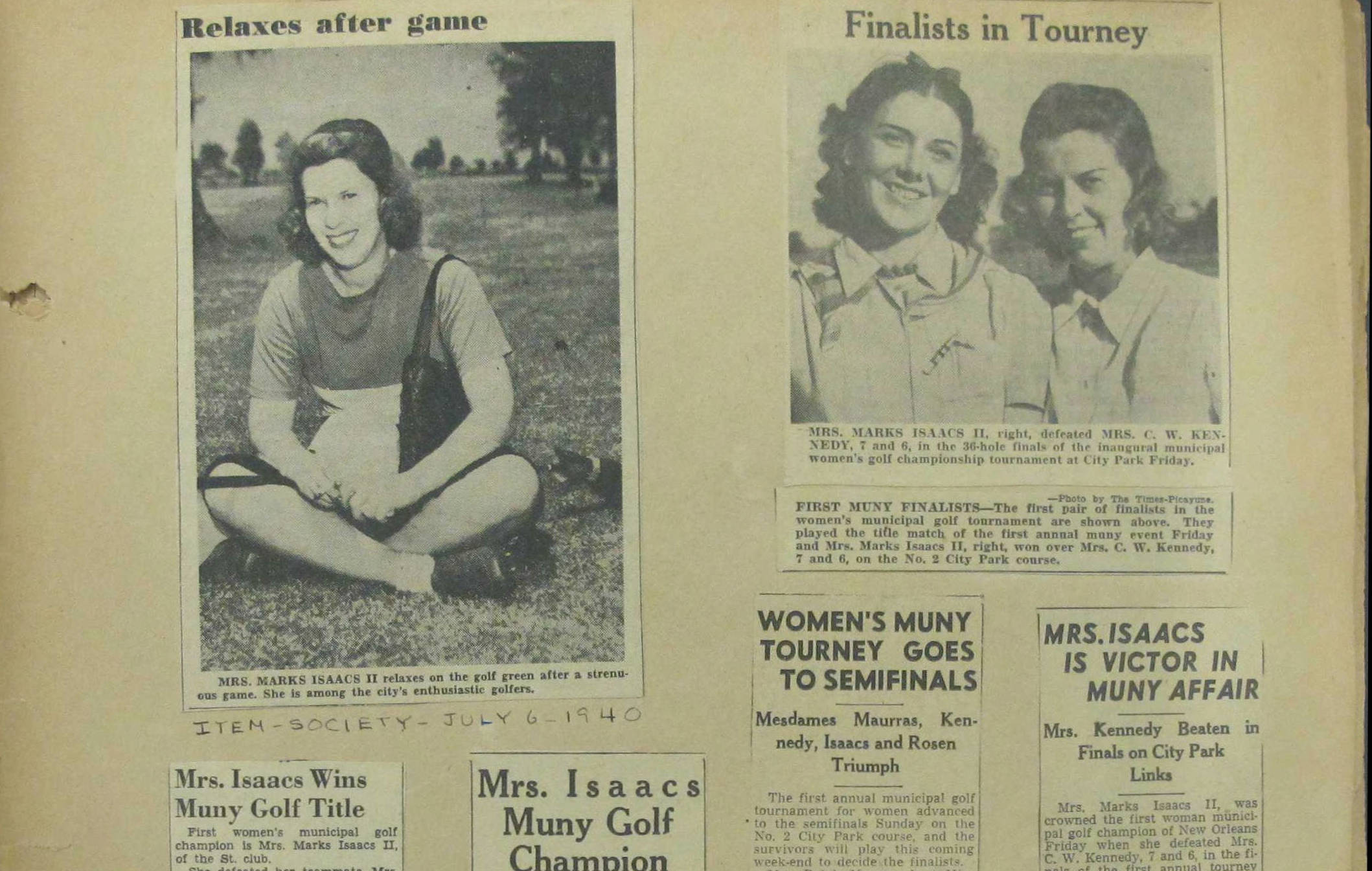
Jill Jackson memorializes prominent female athletes. Photo provided by the Newcomb College Scrapbook Collection at Tulane University.
Jill Jackson’s deliberate placement of articles throughout her scrapbook timelines her pursuit of her dream and how it eventually came to fruition. Jill Jackson was a part of the minority – a female entering a male-dominant world. Because of this, I believe that Jill Jackson’s scrapbook was not made for someone in particular, but for the minority class in general. I think that Jill Jackson wants to be remembered as physical proof reminding individuals that if they pursue what they believe in, eventually their dreams may come true.
[Editor’s Note: This article was captured as part of the class “Media Histories” taught by Vicki Mayer in collaboration with the Office of Alumni Affairs at Tulane University.]
 Big Chem-EZ: How can small Louisiana communities access clean drinking water after a hurricane?
When I went to visit the Pointe-au-Chien tribe after Hurricane Ida with my Service Learning class, I heard that one of the biggest challenges in the aftermath of the hurricane was finding enough drinking water, so in this article, I explore water purification methods: 1) when they are necessary, 2) how they work, and 3) if they really make your water safe to drink.
Big Chem-EZ: How can small Louisiana communities access clean drinking water after a hurricane?
When I went to visit the Pointe-au-Chien tribe after Hurricane Ida with my Service Learning class, I heard that one of the biggest challenges in the aftermath of the hurricane was finding enough drinking water, so in this article, I explore water purification methods: 1) when they are necessary, 2) how they work, and 3) if they really make your water safe to drink.
 Big Chem-EZ: Why is southeastern Louisiana heavily impacted by storms?
This article explores the positive and negative impacts of the engineering industry on Louisiana, including how it is impacted by storms. The author also suggests a call to action to support Louisiana coastal restoration. Big Chem-EZ discusses how finding the best course of action can be challenging, and introduces various proposed solutions to wetland loss and environmental impacts on Louisiana industries.
Big Chem-EZ: Why is southeastern Louisiana heavily impacted by storms?
This article explores the positive and negative impacts of the engineering industry on Louisiana, including how it is impacted by storms. The author also suggests a call to action to support Louisiana coastal restoration. Big Chem-EZ discusses how finding the best course of action can be challenging, and introduces various proposed solutions to wetland loss and environmental impacts on Louisiana industries.
